人教版九年级全册 Unit 1 How can we become good learners?Section B 2a-2e 课件 (共17张PPT)
文档属性
| 名称 | 人教版九年级全册 Unit 1 How can we become good learners?Section B 2a-2e 课件 (共17张PPT) | 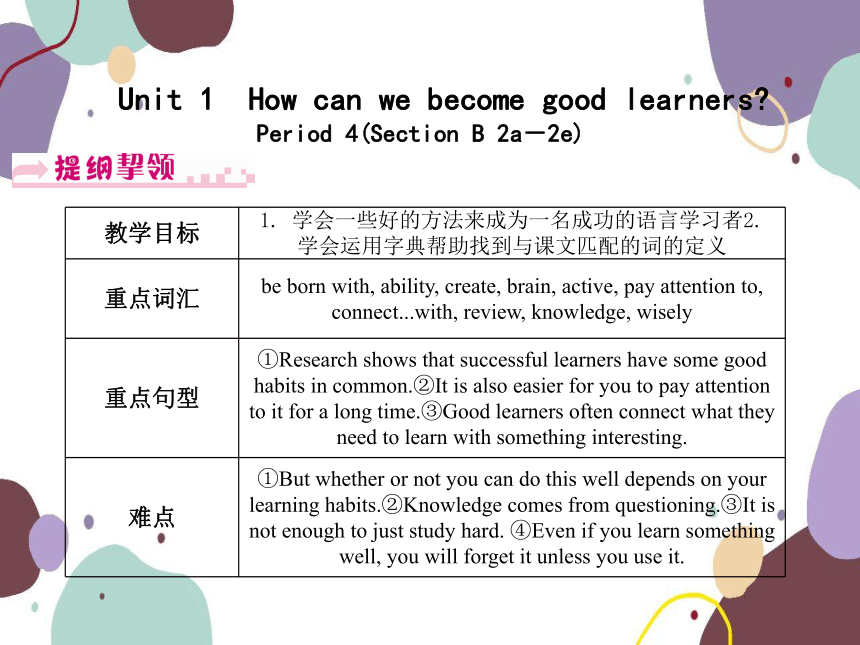 | |
| 格式 | pptx | ||
| 文件大小 | 224.2KB | ||
| 资源类型 | 教案 | ||
| 版本资源 | 人教新目标(Go for it)版 | ||
| 科目 | 英语 | ||
| 更新时间 | 2022-10-12 13:48:02 | ||
图片预览

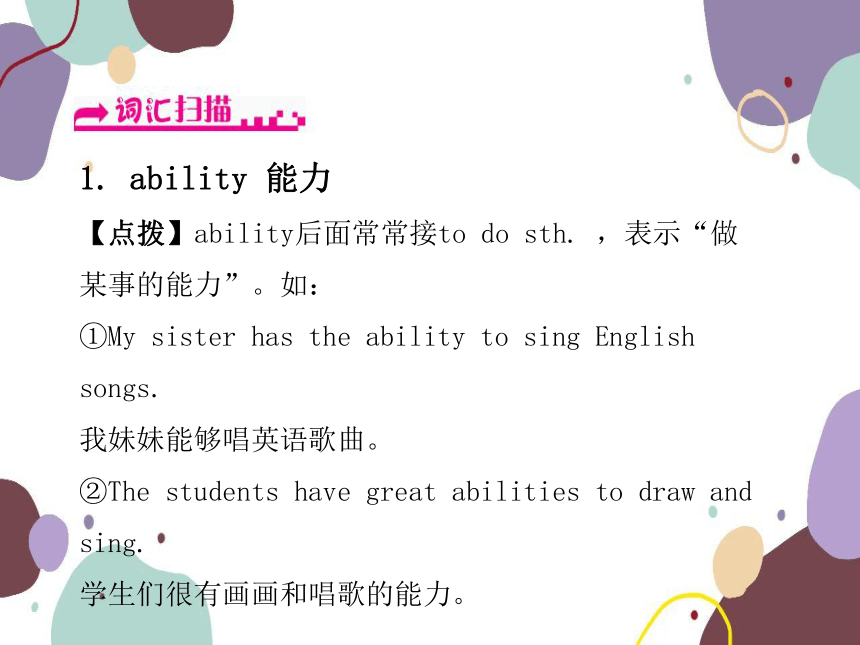
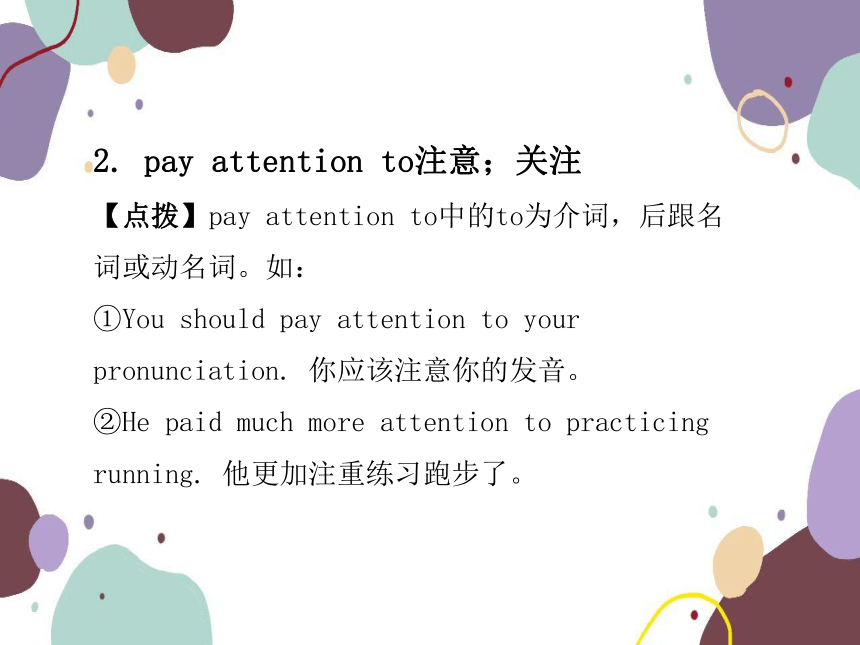
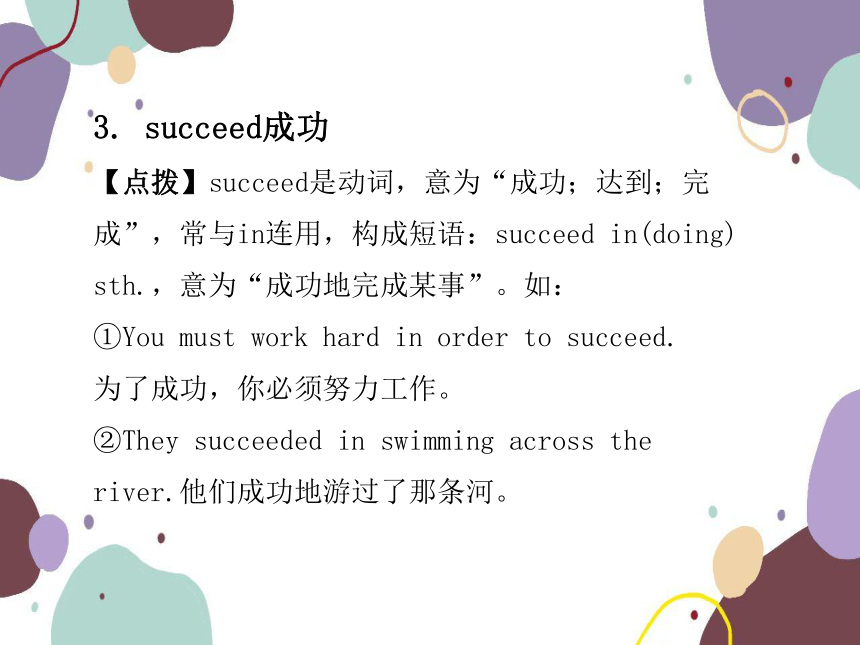
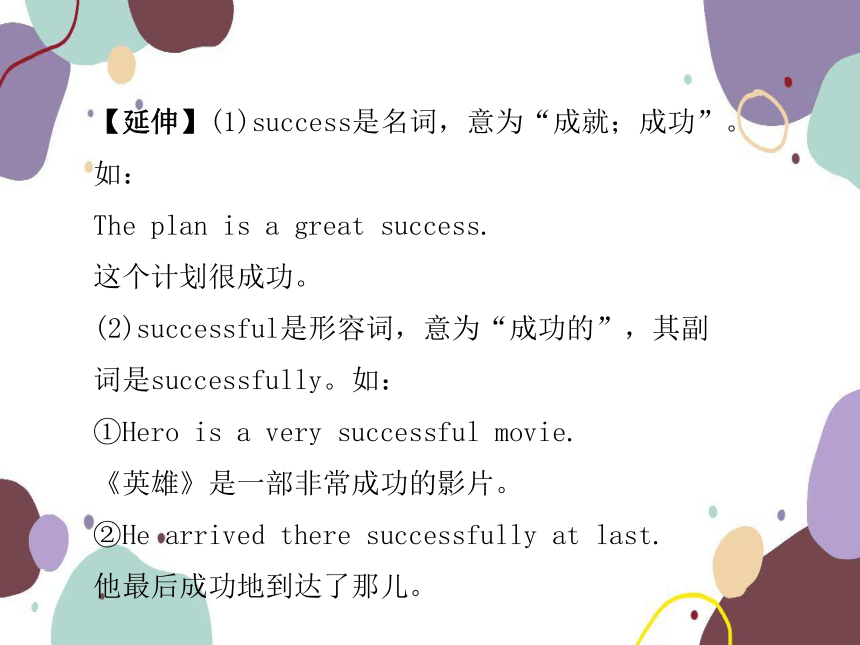
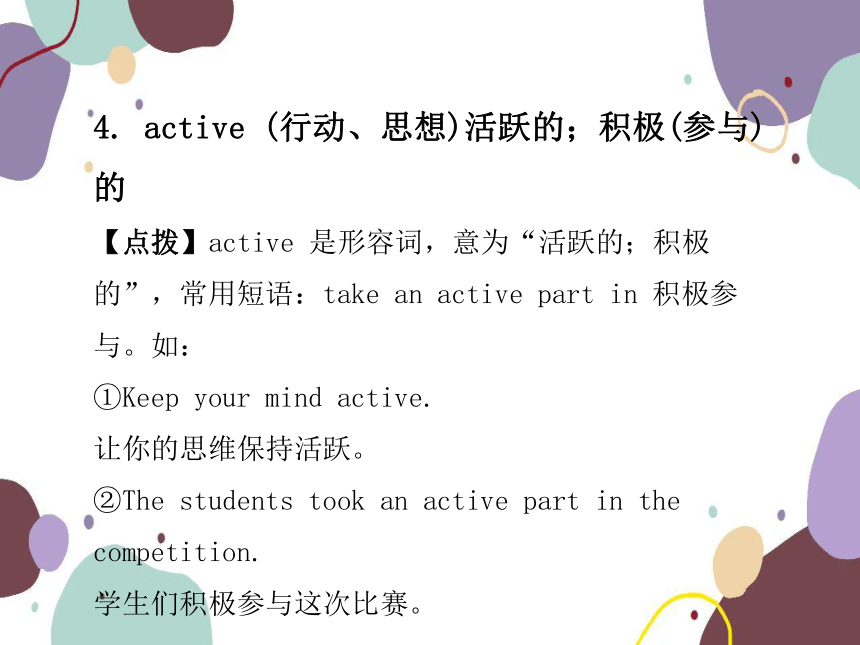
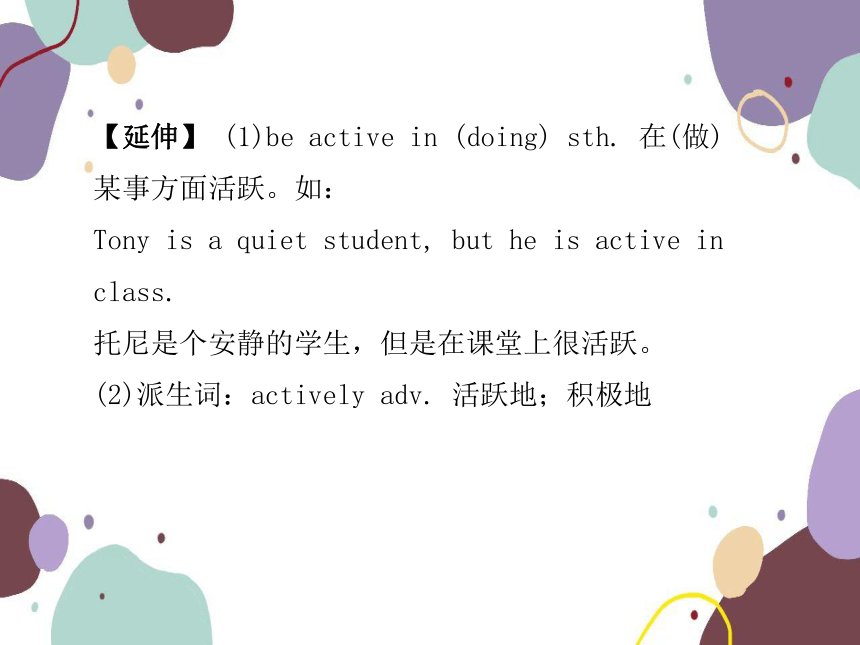
文档简介
(共17张PPT)
Unit 1 How can we become good learners
Period 4(Section B 2a-2e)
教学目标 1. 学会一些好的方法来成为一名成功的语言学习者2. 学会运用字典帮助找到与课文匹配的词的定义
重点词汇 be born with, ability, create, brain, active, pay attention to, connect...with, review, knowledge, wisely
重点句型 ①Research shows that successful learners have some good habits in common.②It is also easier for you to pay attention to it for a long time.③Good learners often connect what they need to learn with something interesting.
难点 ①But whether or not you can do this well depends on your learning habits.②Knowledge comes from questioning.③It is not enough to just study hard. ④Even if you learn something well, you will forget it unless you use it.
1. ability 能力
【点拨】ability后面常常接to do sth. ,表示“做某事的能力”。如:
①My sister has the ability to sing English songs.
我妹妹能够唱英语歌曲。
②The students have great abilities to draw and sing.
学生们很有画画和唱歌的能力。
2. pay attention to注意;关注
【点拨】pay attention to中的to为介词,后跟名词或动名词。如:
①You should pay attention to your pronunciation. 你应该注意你的发音。
②He paid much more attention to practicing running. 他更加注重练习跑步了。
3. succeed成功
【点拨】succeed是动词,意为“成功;达到;完成”,常与in连用,构成短语:succeed in(doing) sth.,意为“成功地完成某事”。如:
①You must work hard in order to succeed.
为了成功,你必须努力工作。
②They succeeded in swimming across the river.他们成功地游过了那条河。
【延伸】(1)success是名词,意为“成就;成功”。如:
The plan is a great success.
这个计划很成功。
(2)successful是形容词,意为“成功的”,其副词是successfully。如:
①Hero is a very successful movie.
《英雄》是一部非常成功的影片。
②He arrived there successfully at last.
他最后成功地到达了那儿。
4. active (行动、思想)活跃的;积极(参与)的
【点拨】active 是形容词,意为“活跃的;积极的”,常用短语:take an active part in 积极参与。如:
①Keep your mind active.
让你的思维保持活跃。
②The students took an active part in the competition.
学生们积极参与这次比赛。
【延伸】 (1)be active in (doing) sth. 在(做)某事方面活跃。如:
Tony is a quiet student, but he is active in class.
托尼是个安静的学生,但是在课堂上很活跃。
(2)派生词:actively adv. 活跃地;积极地
5. connect 连接;把……联系起来
【点拨】connect是动词,意为“连接;把……联系起来”,常与“with/to”连用,构成短语:connect... with /to... 把……和……连接或联系起来。如:
①I can't connect my computer to the Internet.
我的电脑连不上网。
②As an international language, English connects you with the rest of the world.
作为一种国际语言,英语把你和外界联系起来。
【延伸】(1)派生词:connected 是形容词,意为“有联系的;关联的”。如:
The Internet is closely connected with our daily life.
互联网与我们的日常生活密切相关。
(2)connection是名词,意为“联系;关联;连接”。如:
Scientists have studied the connection between color and mood for a long time.
科学家们对颜色与心情之间的关系已经研究了很久。
1. But whether or not you can do this well depends on your learning habits.
但是你能否做好这件事取决于你的学习习惯。
【点拨】(1)whether or not you can do this well是主语从句,在这里作主语,主语从句作主语要看成单数。如:
What he said is unbelievable.
他所说的话是不可信的。
(2)depend on意为“取决于;依赖于”。如:
Whether we will go there or not depends on the weather. 我们是否去那里取决于天气。
2. Research shows that successful learners have some good habits in common.
研究表明成功的学习者有一些相同的好习惯。
【点拨】have sth. in common(with sb./sth.)意为“(与某人/某物)有相同之处”。如:
Their methods have a lot in common.
他们的方法有很多相同之处。
3. Studies show that if you are interested in something, your brain is more active and it is also easier for you to pay attention to it for a long time.
研究表明如果你对某事物感兴趣,你的大脑就会更积极,长时间地关注这一事物对你来说也会变得更容易。
【点拨】(1)be interested in sth./doing sth. 意为“对(做)某事很感兴趣”。通常以-ed结尾的形容词用来修饰人,描述人的声音、表情或感受;以-ing结尾的形容词常用来修饰事物,描述事物的状态或性质。如:
I'm not really interested in music.
我对音乐不是很感兴趣。
与之类似的词还有:disappointed 失望的,disappointing 令人失望的;bored 感到无聊的,boring 无聊的; excited 兴奋的, exciting 令人兴奋的。
(2)it在后半句中作形式主语,其后的动词不定式短语才是真正的主语。for sb. 是不定式短语的逻辑主语,构成句型It+be+adj.+for sb.+to do sth. ,意为“对某人来说做某事是……的”。
【辨析】It's+adj.+for sb. to do sth.与It's+adj.+of sb. to do sth.
(1)for sb. 表示“对于某人”,该句型中用easy, important等描述事物特征的形容词, for后的sb.与形容词没有主表关系。如:
It's very dangerous for you to ride so fast.
你骑那么快是很危险的。
(2)of sb.表示“某人是……的”,该句型中用clever, kind, nice等描述人物性格、特征的形容词,of后的sb.与形容词有主表关系。如:
It's good of you to give me a hand when I need.
在我需要的时候帮我一把,你真是太好了。
4. Even if you learn something well, you will forget it unless you use it.
即使你把某些东西学得很好,除非你使用它,不然也会忘记。
【点拨】unless作连词,意为“除非;如果不”,引导条件状语从句,含有否定意义,相当于if...not。如:
I shall go to the supermarket unless it rains.=I shall go to the supermarket if it doesn't rain.
如果不下雨我就去超市。
5. Knowledge comes from questioning.
知识源于质疑。
【点拨】(1)question 在此处作动词,放在介词from之后,用动词-ing形式,意为“质疑;质问”。如:
①He will question whether we have told him the truth. 他会质问我们是否向他说了实话。
②The police questioned him for half an hour about the accident.
关于那个事故警察询问了他半个小时。
(2)question也可作可数名词,意为“问题”。如:
the answer to the question 这个问题的答案
Unit 1 How can we become good learners
Period 4(Section B 2a-2e)
教学目标 1. 学会一些好的方法来成为一名成功的语言学习者2. 学会运用字典帮助找到与课文匹配的词的定义
重点词汇 be born with, ability, create, brain, active, pay attention to, connect...with, review, knowledge, wisely
重点句型 ①Research shows that successful learners have some good habits in common.②It is also easier for you to pay attention to it for a long time.③Good learners often connect what they need to learn with something interesting.
难点 ①But whether or not you can do this well depends on your learning habits.②Knowledge comes from questioning.③It is not enough to just study hard. ④Even if you learn something well, you will forget it unless you use it.
1. ability 能力
【点拨】ability后面常常接to do sth. ,表示“做某事的能力”。如:
①My sister has the ability to sing English songs.
我妹妹能够唱英语歌曲。
②The students have great abilities to draw and sing.
学生们很有画画和唱歌的能力。
2. pay attention to注意;关注
【点拨】pay attention to中的to为介词,后跟名词或动名词。如:
①You should pay attention to your pronunciation. 你应该注意你的发音。
②He paid much more attention to practicing running. 他更加注重练习跑步了。
3. succeed成功
【点拨】succeed是动词,意为“成功;达到;完成”,常与in连用,构成短语:succeed in(doing) sth.,意为“成功地完成某事”。如:
①You must work hard in order to succeed.
为了成功,你必须努力工作。
②They succeeded in swimming across the river.他们成功地游过了那条河。
【延伸】(1)success是名词,意为“成就;成功”。如:
The plan is a great success.
这个计划很成功。
(2)successful是形容词,意为“成功的”,其副词是successfully。如:
①Hero is a very successful movie.
《英雄》是一部非常成功的影片。
②He arrived there successfully at last.
他最后成功地到达了那儿。
4. active (行动、思想)活跃的;积极(参与)的
【点拨】active 是形容词,意为“活跃的;积极的”,常用短语:take an active part in 积极参与。如:
①Keep your mind active.
让你的思维保持活跃。
②The students took an active part in the competition.
学生们积极参与这次比赛。
【延伸】 (1)be active in (doing) sth. 在(做)某事方面活跃。如:
Tony is a quiet student, but he is active in class.
托尼是个安静的学生,但是在课堂上很活跃。
(2)派生词:actively adv. 活跃地;积极地
5. connect 连接;把……联系起来
【点拨】connect是动词,意为“连接;把……联系起来”,常与“with/to”连用,构成短语:connect... with /to... 把……和……连接或联系起来。如:
①I can't connect my computer to the Internet.
我的电脑连不上网。
②As an international language, English connects you with the rest of the world.
作为一种国际语言,英语把你和外界联系起来。
【延伸】(1)派生词:connected 是形容词,意为“有联系的;关联的”。如:
The Internet is closely connected with our daily life.
互联网与我们的日常生活密切相关。
(2)connection是名词,意为“联系;关联;连接”。如:
Scientists have studied the connection between color and mood for a long time.
科学家们对颜色与心情之间的关系已经研究了很久。
1. But whether or not you can do this well depends on your learning habits.
但是你能否做好这件事取决于你的学习习惯。
【点拨】(1)whether or not you can do this well是主语从句,在这里作主语,主语从句作主语要看成单数。如:
What he said is unbelievable.
他所说的话是不可信的。
(2)depend on意为“取决于;依赖于”。如:
Whether we will go there or not depends on the weather. 我们是否去那里取决于天气。
2. Research shows that successful learners have some good habits in common.
研究表明成功的学习者有一些相同的好习惯。
【点拨】have sth. in common(with sb./sth.)意为“(与某人/某物)有相同之处”。如:
Their methods have a lot in common.
他们的方法有很多相同之处。
3. Studies show that if you are interested in something, your brain is more active and it is also easier for you to pay attention to it for a long time.
研究表明如果你对某事物感兴趣,你的大脑就会更积极,长时间地关注这一事物对你来说也会变得更容易。
【点拨】(1)be interested in sth./doing sth. 意为“对(做)某事很感兴趣”。通常以-ed结尾的形容词用来修饰人,描述人的声音、表情或感受;以-ing结尾的形容词常用来修饰事物,描述事物的状态或性质。如:
I'm not really interested in music.
我对音乐不是很感兴趣。
与之类似的词还有:disappointed 失望的,disappointing 令人失望的;bored 感到无聊的,boring 无聊的; excited 兴奋的, exciting 令人兴奋的。
(2)it在后半句中作形式主语,其后的动词不定式短语才是真正的主语。for sb. 是不定式短语的逻辑主语,构成句型It+be+adj.+for sb.+to do sth. ,意为“对某人来说做某事是……的”。
【辨析】It's+adj.+for sb. to do sth.与It's+adj.+of sb. to do sth.
(1)for sb. 表示“对于某人”,该句型中用easy, important等描述事物特征的形容词, for后的sb.与形容词没有主表关系。如:
It's very dangerous for you to ride so fast.
你骑那么快是很危险的。
(2)of sb.表示“某人是……的”,该句型中用clever, kind, nice等描述人物性格、特征的形容词,of后的sb.与形容词有主表关系。如:
It's good of you to give me a hand when I need.
在我需要的时候帮我一把,你真是太好了。
4. Even if you learn something well, you will forget it unless you use it.
即使你把某些东西学得很好,除非你使用它,不然也会忘记。
【点拨】unless作连词,意为“除非;如果不”,引导条件状语从句,含有否定意义,相当于if...not。如:
I shall go to the supermarket unless it rains.=I shall go to the supermarket if it doesn't rain.
如果不下雨我就去超市。
5. Knowledge comes from questioning.
知识源于质疑。
【点拨】(1)question 在此处作动词,放在介词from之后,用动词-ing形式,意为“质疑;质问”。如:
①He will question whether we have told him the truth. 他会质问我们是否向他说了实话。
②The police questioned him for half an hour about the accident.
关于那个事故警察询问了他半个小时。
(2)question也可作可数名词,意为“问题”。如:
the answer to the question 这个问题的答案
同课章节目录
- Unit 1 How can we become good learners.
- Section A
- Section B
- Unit 2 I think that mooncakes are delicious!
- Section A
- Section B
- Unit 3 Could you please tell me where the restroom
- Section A
- Section B
- Unit 4 I used to be afraid of the dark.
- Section A
- Section B
- Unit 5 What are the shirts made of?
- Section A
- Section B
- Review of Units 1-5
- Unit 6 When was it invented?
- Section A
- Section B
- Unit 7 Teenagers should be allowed to choose their
- Section A
- Section B
- Unit 8 It must belong to Carla.
- Section A
- Section B
- Unit 9 I like music that I can dance to.
- Section A
- Section B
- Unit 10 You're supposed to shake hands.
- Section A
- Section B
- Review of Units 6-10
- Unit 11 Sad movies make me cry.
- Section A
- Section B
- Unit 12 Life is full of the unexpected
- Section A
- Section B
- Unit 13 We're trying to save the earth!
- Section A
- Section B
- Unit 14 I remember meeting all of you in Grade 7.
- Section A
- Section B
- Review of Units 11-14
